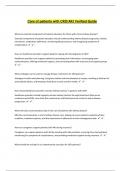Exam (elaborations)
Care of patients with CKD/AKI Verified Guide
- Course
- Institution
Care of patients with CKD/AKI Verified Guide What are essential components of patient education for those with chronic kidney disease? Essential components of patient education include understanding kidney disease progression, dietary restrictions, medication adherence, monitoring blood pre...
[Show more]



